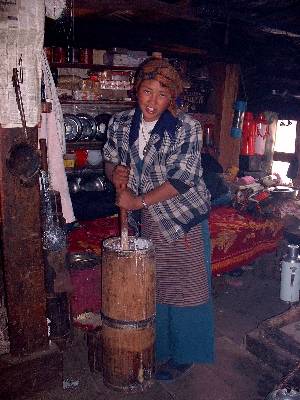BridgesProjects in Rational Tourism Development |
 |
| Home | Update | Program Overview | Photos | Resources | Sitemap | Contact |
About Bridges-PRTD
The basic idea behind Bridges-PRTD is that the preservation of our last best places must take into account that most of them are inhabited. The core problem is to find a way for the inhabitants of remote mountain destinations to maximize economic opportunity without resorting to damaging extractive industry: logging, mining, big-game hunting, poaching, large-scale hydro development, and so on. Tourism presents obvious advantages, as well as risks. For most remote destinations, low-impact independent backpacker tourism seems to allow the best compromise between development and conservation, for the following reasons:

- The existing natural and cultural environment are the primary assets; conservation and respect for tradition become economically sound strategies for the host communities.
- Independent backpackers tend to rely on local accommodations and services; there is comparatively little economic leakage.
- Since many independent backpackers are looking for adventure and even danger, it is not necessary to develop access, infrastructure, and support services before opening a new area. Start-up can be immediate with little or no investment.
- Independent backpackers are generally rather flexible in their itineraries and agendas; therefore host communities can compete for tourist dollars through enhancements which encourage longer stays.
On the other hand, independent backpacker tourism does not and cannot exist in a void. Guided tours play an essential role in many destinations, particularly those that are extremely fragile or that lack basic infrastructure; in addition, there are tourism consumers for whom independent backpacking is not physically possible. Again, there are certain activities that may have important benefits for the host communities and ecosystems, but which cannot be carried out without equipment and other support beyond the capabilities of independent backpackers. The contributions of these sectors are not to be minimized.
Why specify rational tourism development?
There are many sobriquets for the kind of tourism we favor, and most of them have problems. Ecotourism is claimed by organizations with heavy ideological baggage, lots of rules and stipulations, and no way of enforcing them; and, conversely, by hundreds of tour operators and promoters for whom it means whatever they want it to mean. Sustainable is a non-sequitur. What are we trying to sustain? The backwards economies and medieval life styles that are the stock-in-trade of tour operators and development agencies alike? The pace of change? But if tourism succeeds in expanding opportunities, the basic assets of the remote destination are doomed. Furthermore, if the opportunities expand, how long will these communities want to remain open to hordes of camera-clicking foreigners trouping through and commodifying their culture? This kind of tourism is inherently unsustainable. Appropriate? What does that really mean? We chose rational simply because we didn't want to imply that any tourism development is okay. But we're definitely not attached to the word.
Tourism Development Projects
The study abroad/volunteer program is conceived of as a pilot project, which, if successful, would lead to an archipelago of similar projects in developing destinations around the world. Our premise is that study and volunteer work are two forms of tourism that are good for the guest and good for the host. The problem with study and volunteer opportunities now is that they are organized from afar: people pay thousands of dollars to an organization based in New York City for the privilege of collecting iguana eggs in the Galapagos or something like that. We think the host communities should each have an office with a bulletin board -- maybe even an Internet presence; when tourists arrive, they should think, This is a swell place. Wonder what's to do around here? At the office they'll find out that they can go help dig a garbage pit for the afternoon, or help restore monastery frescoes; or, if they have a few weeks, an English course is needed. Or maybe help with a hydro installation. If they want to stay for a couple of months, there are ongoing research projects they can help with. Meanwhile, they'd be living in lodges or teahouses, just like other tourists, but spending more money and doing something useful.
The study/volunteer program is, therefore, a development project in itself, which involves facilitating other projects. We bring people to Rolwaling and help them set up projects which are compatible with the people's needs and with the participants' skills and interests. These projects could be short-term or long-term, practical, or academic. An important point is that the projects belong to the entire group and to the host community: this means that all results are shared, and can be carried on from year to year. If you can't finish up, you can return the next year (without paying additional fees&) or we can look for others to continue the work. No effort is wasted.
It is worth stressing that our projects are not limited to Rolwaling Valley. There are important linkages between peripheral mountain communities and the lowland core. For instance, the question of trekking peak permit regulations involves policies set and implemented in Kathmandu. Again, many Rolwaling natives have moved to Kathmandu; there is no way to talk about the future of the valley without establishing communication with these people. In many respects, plans for Rolwaling depend on understanding what is happening elsewhere: a study illuminating the successes and failures of the national park in the the next valley will be useful in planning how to manage tourism in Rolwaling. And, for one final example, there is the garbage problem. Why bother collecting it and carrying it out of the mountains when Kathmandu itself has no effective waste management? The point is, you are not limited to actually working in Rolwaling Valley itself.
